Gathering a comprehensive patient medical history is a foundational step in providing quality care. Yet, creating an effective and efficient form from scratch can be a major drain on resources for any practice, from a small private clinic to a large hospital system. A poorly designed form leads to incomplete information, frustrated patients, and administrative bottlenecks that take time away from what matters most: patient care. This is where a high-quality medical history form template becomes essential, streamlining the entire data collection process.
This resource list is designed to help you find the perfect solution for your specific needs. We've compiled the best free and premium templates from a range of sources, including innovative AI tools, trusted office supply retailers, and powerful online form builders. Each option is presented with a clear breakdown of its key features, ideal use cases, and practical limitations, complete with screenshots and direct links to get you started quickly. A well-designed medical history form acts as a crucial patient intake form template, improving both office efficiency and the quality of patient care from the very first interaction. Our goal is to cut through the noise and provide a straightforward guide to help you choose the right template for your practice.
1. Voice Ai Agent – Pre Visit Intake
For practices ready to move beyond static PDFs, the Voice AI Agent for Pre-Visit Intake by Simbie AI represents a paradigm shift in how patient data is collected. Rather than presenting a traditional medical history form template, this platform automates the entire intake process using a sophisticated voice-based AI. It proactively contacts patients before their appointment to conduct a guided, conversational interview, capturing everything from chief complaints and past surgical histories to medication reconciliation. This innovative approach significantly reduces the administrative burden on front-desk staff, who often spend considerable time chasing down patient information.
This solution excels in its deep integration and real-time documentation capabilities. The AI agent, designed by clinicians, directly populates the collected data into the practice's EMR system in the correct format, eliminating manual data entry and potential transcription errors. This ensures the patient’s chart is complete and accurate before they even arrive, streamlining clinical workflows and reducing in-office wait times. Its 24/7 availability and HIPAA-compliant framework make it an exceptionally reliable and secure choice for modernizing the pre-visit experience. The conversational nature of the AI can also lead to more detailed and accurate patient histories, as it can dynamically ask follow-up questions based on patient responses—a feature static forms cannot replicate.
For practices exploring voice technology, it's also worth noting the broader landscape. While Simbie AI focuses on intake automation, those needing robust dictation tools might explore affordable alternatives to Dragon Naturally Speaking to find a solution that fits their specific clinical documentation needs. The adoption of voice AI in healthcare is a growing trend, and understanding the different applications is key to leveraging this technology effectively.
Key Strengths:
- Automated Data Capture: Fully automates the collection of patient history via conversational AI, saving significant staff time.
- EMR Integration: Seamlessly syncs verified patient information directly into existing EMRs, ensuring data accuracy and consistency.
- Operational Efficiency: Reduces administrative overhead by up to 60% and frees up staff to focus on higher-value patient care tasks.
Learn more about the Voice AI Agent for Pre-Visit Intake
2. Amazon
For those seeking physical, pre-printed solutions, Amazon offers a surprisingly vast marketplace for medical history form templates. Instead of digital downloads, you’ll find notebooks, notepads, and tear-off sheets designed for manual data collection. These are particularly useful for medical students, residents learning to take H&P (History and Physical) notes, or small practices that still rely on paper records for initial intake. The primary advantage is the sheer variety and competitive pricing, allowing you to find a layout that fits your specific needs without committing to a large, custom print order. Many products are available with Prime shipping, making it a fast and convenient option for restocking essential supplies.
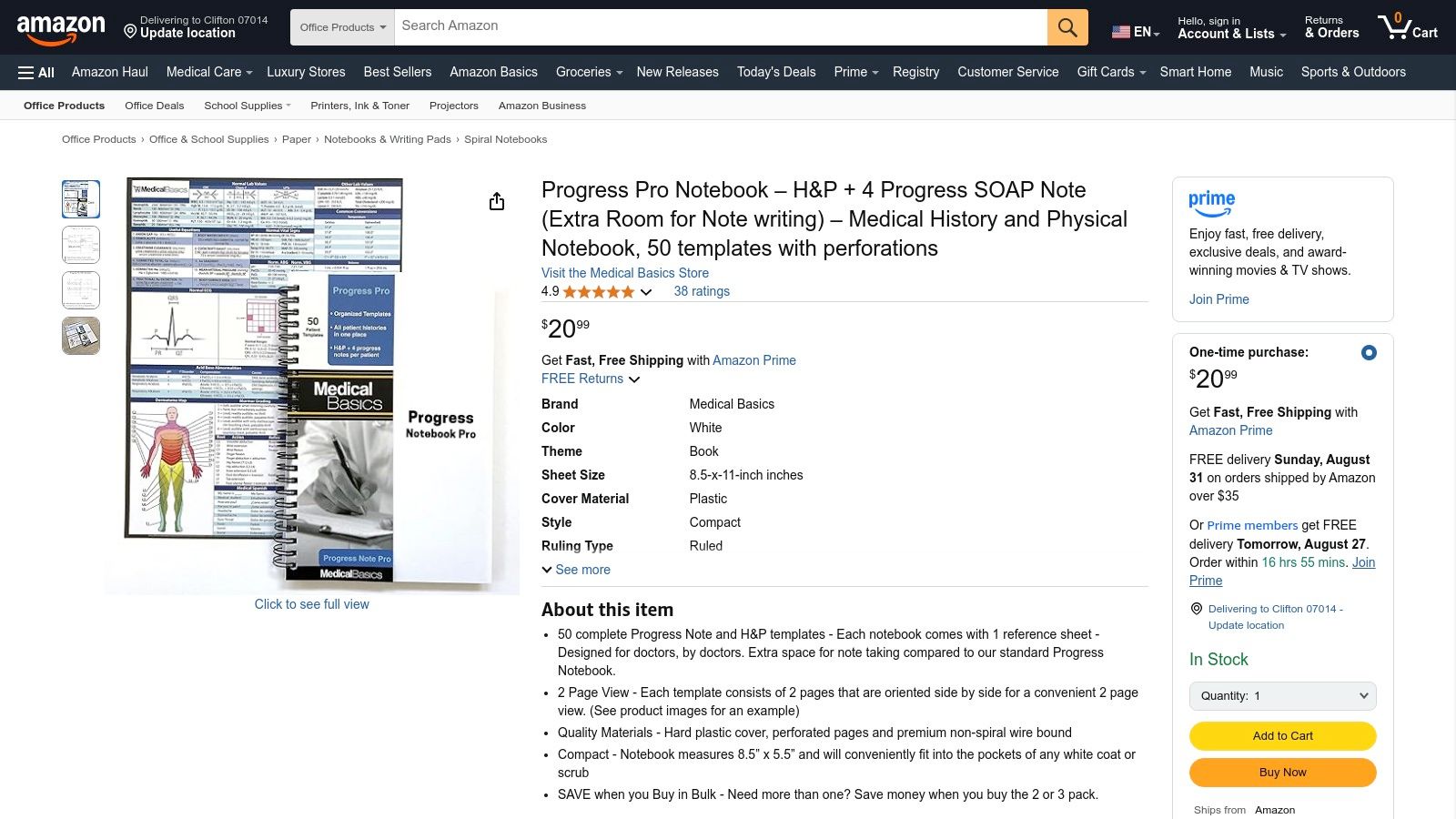
The platform’s user reviews are a critical resource here, offering real-world feedback on paper quality, ink durability, and the practicality of different template formats. While convenient and affordable, these templates are not inherently HIPAA-compliant for digital storage or transmission. They serve best as a data collection tool before information is securely transferred into an EMR system. It's crucial for practices using paper forms to have a clear, documented process for scanning and shredding documents to maintain patient privacy and comply with regulations.
Best For: Medical students, residents, and small clinics needing affordable, physical H&P notebooks or intake pads.
Key Considerations
- Format: Primarily paper-based notebooks and pads.
- Cost: Varies by seller, but generally very affordable.
- Customization: No customization options; you choose from existing pre-printed designs.
- HIPAA Compliance: Physical forms are not digitally secure; requires a separate, secure process for data management.
3. Staples
For established clinics that prefer traditional, paper-based workflows, Staples is a reliable source for professional, pre-printed medical history form templates. Through its Medical Arts Press line, Staples offers standardized patient health and history forms designed for busy front-desk environments. This option is ideal for practices that need to order forms in bulk alongside other essential office supplies, streamlining the purchasing process through a single, well-known vendor. The main benefit is the convenience of a trusted business supplier that offers both delivery and in-store pickup options, which is particularly helpful for managing inventory in a busy practice.
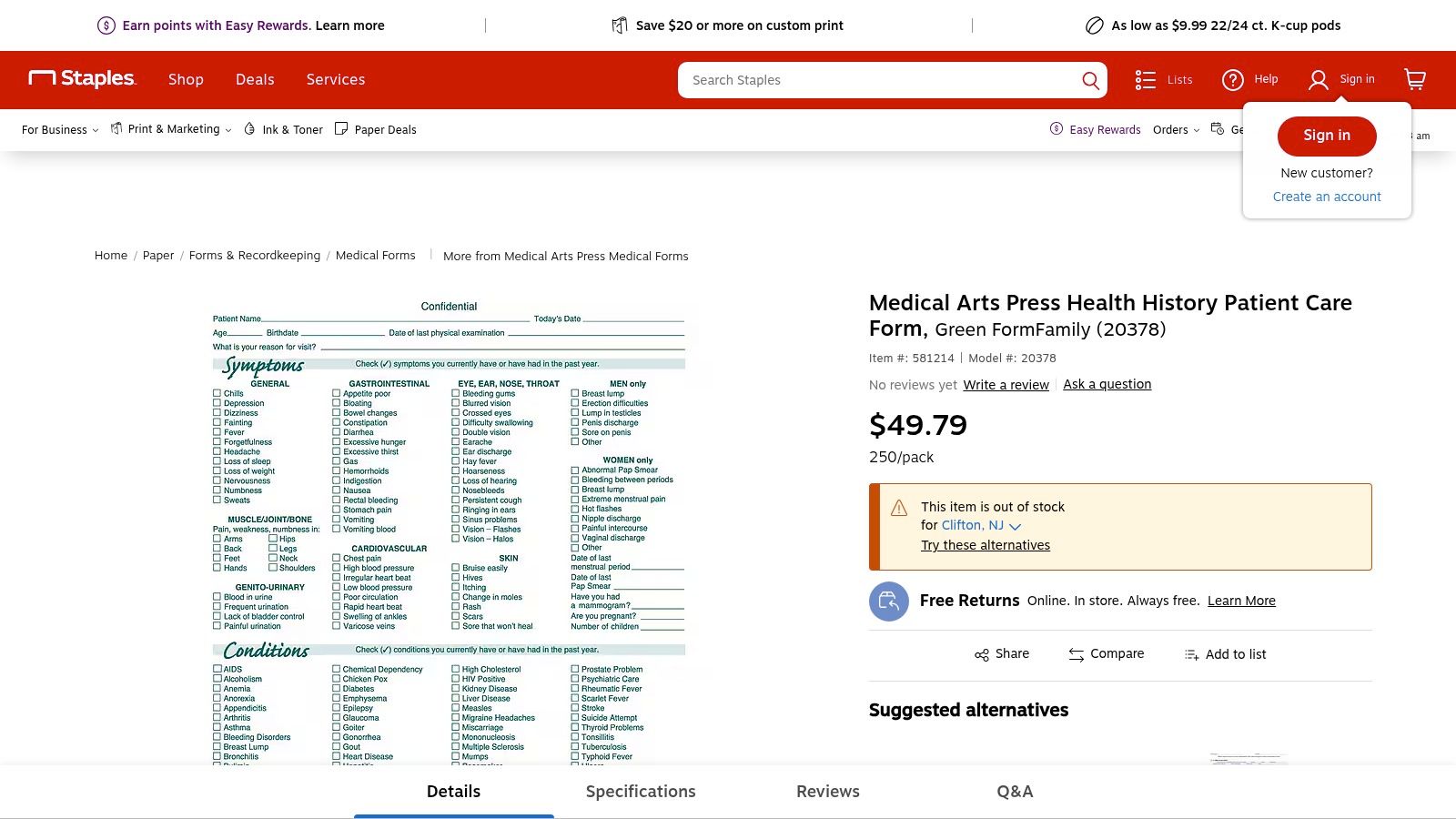
Unlike digital templates, these physical forms integrate seamlessly into existing paper filing systems. While they provide a clear and consistent format for data collection, they require manual entry into an EMR and a secure protocol for storing and disposing of the physical documents to maintain HIPAA compliance. This manual step can introduce transcription errors and consumes valuable staff time. Availability can sometimes be inconsistent, so it's wise to check stock levels before placing a large order for your practice to avoid disruptions in your intake process.
Best For: Clinics and administrative staff who manage office supply procurement and prefer standardized, pre-printed paper forms for patient intake.
Key Considerations
- Format: Pre-printed paper forms, typically sold in bulk packs.
- Cost: Varies based on quantity, but business accounts may offer better pricing.
- Customization: None. Forms come in a standardized, pre-designed format.
- HIPAA Compliance: The paper forms themselves are not digitally secure; requires a compliant internal process for handling and storing patient data.
4. Etsy
Etsy is a creative marketplace offering a diverse collection of digital medical history form templates designed by independent creators. This platform is ideal for solo practitioners, wellness clinics, med-spas, or individuals seeking a more aesthetic or niche-specific design. You can find instantly downloadable and editable templates compatible with Word, PDF, Google Docs, and Canva, allowing for immediate use and customization. The main appeal lies in the unique, non-corporate designs that can be tailored to match a practice's branding, which can help create a more welcoming and personalized patient experience. This is especially valuable in fields like mental health, chiropractic care, or acupuncture.
Since sellers are independent, quality and format can vary, making it crucial to read seller reviews and check item descriptions carefully. While the forms themselves are not HIPAA compliant, they are perfect for gathering initial information which must then be managed within a secure system. The platform’s strength is providing highly affordable and visually appealing starting points for your patient intake process. Once downloaded, these templates can be modified to include specific questions relevant to your practice, offering a good balance between cost-effectiveness and customization.
Best For: Solo practices, wellness clinics, and specialized fields like aesthetics needing affordable, stylish, and easily editable intake forms.
Key Considerations
- Format: Instant digital downloads (PDF, Word, Google Docs, Canva).
- Cost: Low one-time payments, typically under $10.
- Customization: Highly customizable, as templates are provided in editable formats.
- HIPAA Compliance: The templates themselves are not secure; compliance depends on how you collect, store, and transmit the completed forms.
5. Jotform
Jotform is a powerful online form builder that excels in creating secure, digital intake solutions. For clinics transitioning away from paper, its extensive library of ready-made medical history form templates offers a significant head start. The platform is designed for ease of use, allowing healthcare administrators to build and deploy complex forms with conditional logic, e-signature fields, and file upload capabilities without writing a single line of code. This makes it an ideal choice for practices that need a professional, HIPAA-capable solution quickly. The ability to create dynamic forms that show or hide questions based on a patient's previous answers creates a cleaner, more efficient user experience.
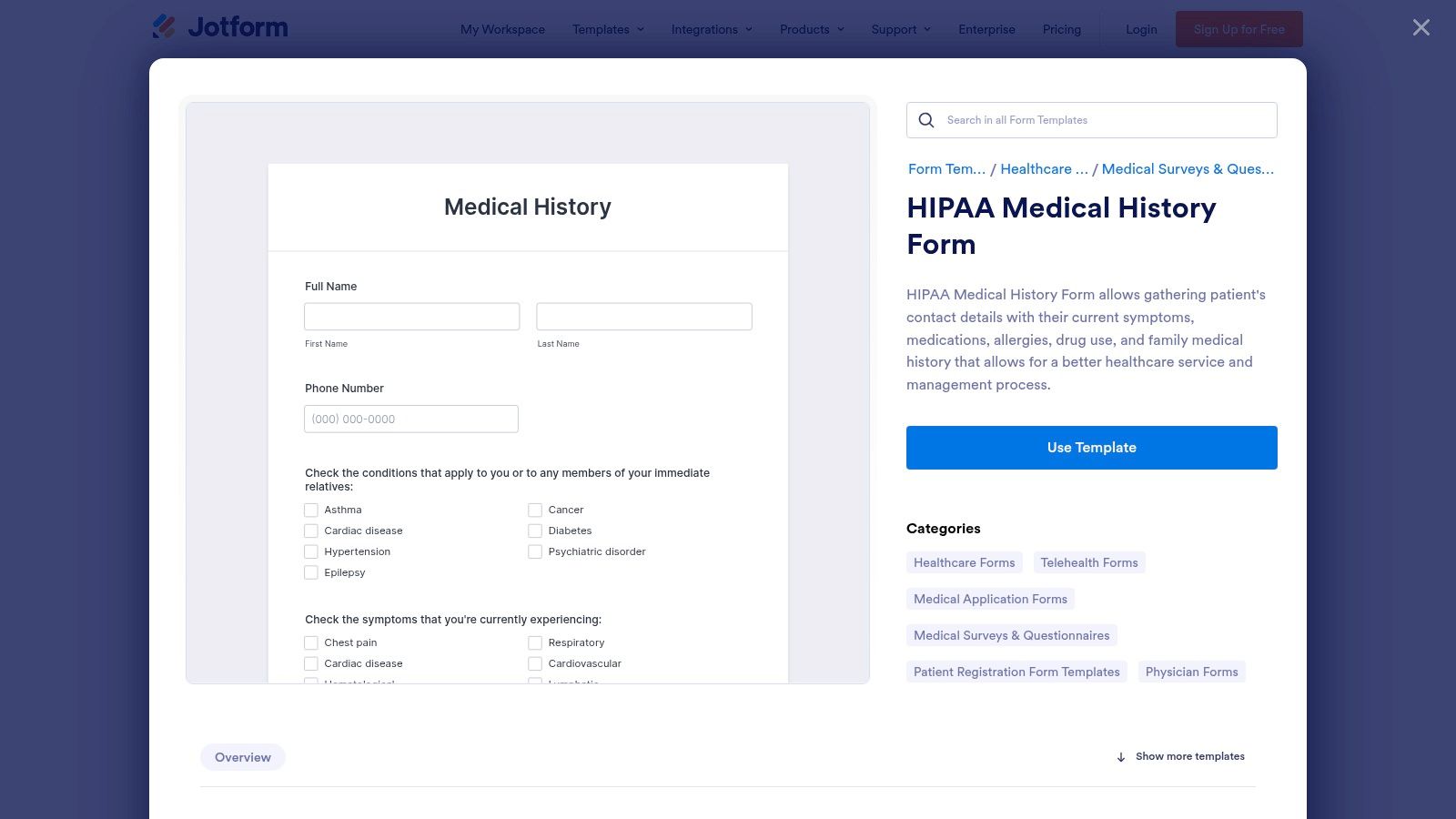
Its key advantage lies in HIPAA compliance features, available on eligible paid plans, which include a signed Business Associate Agreement (BAA). Forms are mobile-friendly and can automatically generate secure, downloadable PDFs of each submission, simplifying integration with existing EMR systems. While the free plan is generous, true medical use requires a paid subscription to activate the necessary security and privacy controls for handling protected health information (PHI). This makes it a scalable option, allowing practices to test the platform before committing to a paid plan.
Best For: Clinics and private practices seeking a user-friendly, HIPAA-capable online form builder to digitize their patient intake process.
Key Considerations
- Format: Digital, web-based forms with PDF output.
- Cost: Free plan available; HIPAA compliance requires a paid Gold or Enterprise plan.
- Customization: Highly customizable with a drag-and-drop editor, conditional logic, and branding options.
- HIPAA Compliance: Available on specific paid plans and requires signing a BAA for full compliance.
6. Formstack
For healthcare organizations that require enterprise-grade security and advanced automation, Formstack is a powerful solution. It moves beyond simple form creation into a full-fledged data management and workflow automation platform. Its HIPAA-compliant medical history form template is built with robust features like data encryption, audit trails, and user-based permissions, making it ideal for larger practices or hospital systems concerned with scalable compliance and integration. The platform’s strength lies in its ability to connect forms to other business systems, such as EMRs, billing software, and patient communication tools, streamlining entire patient onboarding processes.
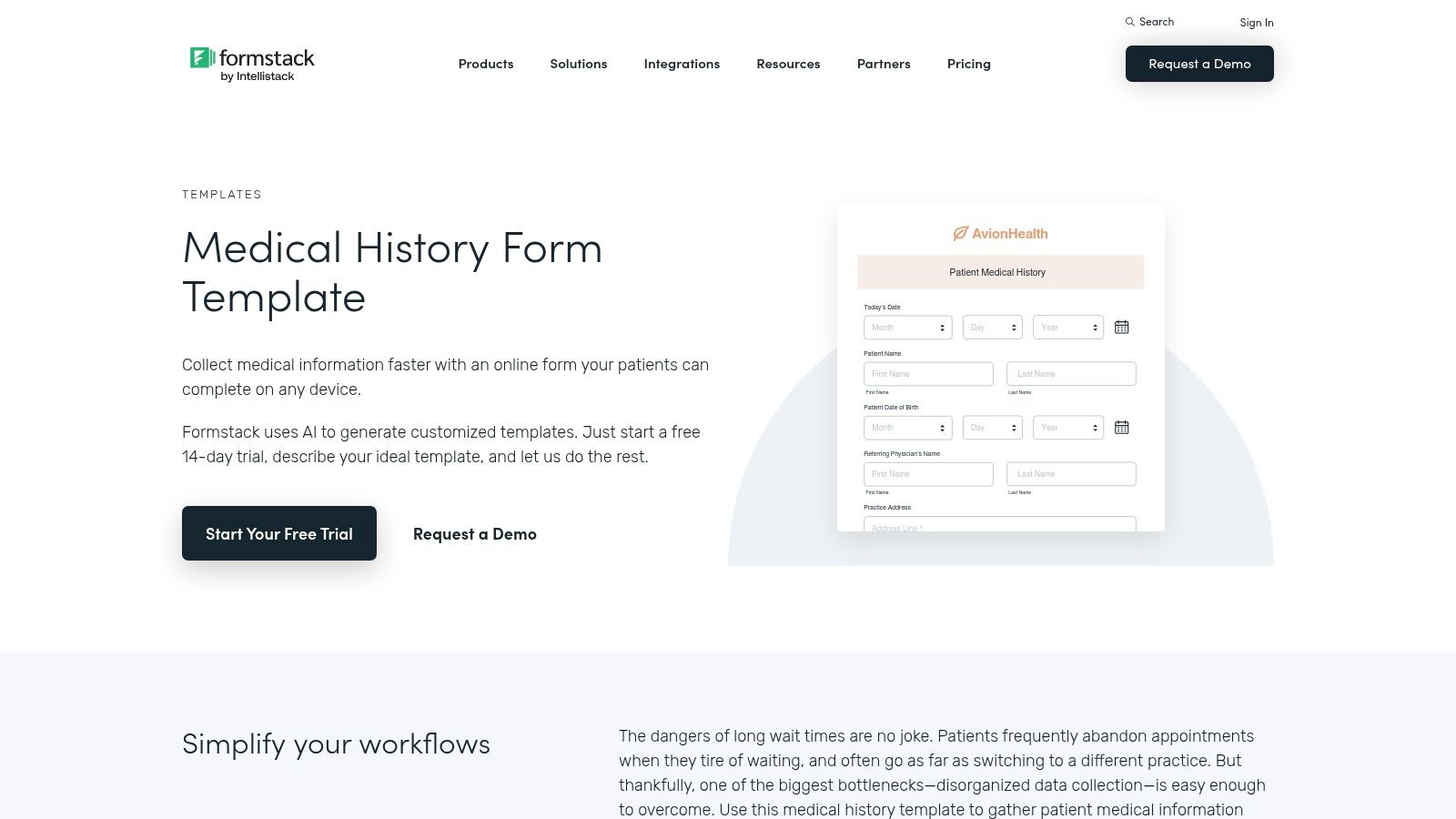
While the feature set is extensive, it comes at a higher price point than basic form builders and involves a steeper learning curve. Setting up custom workflows and integrations may require some initial time investment from an IT or administrative team. However, for organizations that can leverage its capabilities, Formstack provides a secure, efficient, and scalable way to manage sensitive patient information, well beyond a simple medical intake form. It can transform intake from a simple data collection task into the first step of a fully automated patient journey.
Best For: Large clinics, hospital systems, and healthcare organizations needing a HIPAA-compliant solution with advanced workflow automation and integration capabilities.
Key Considerations
- Format: Secure, embeddable online forms with workflow automation.
- Cost: Premium pricing with plans based on features, users, and form submissions.
- Customization: Highly customizable with conditional logic, branding, and third-party integrations.
- HIPAA Compliance: Yes, offers HIPAA-compliant plans with necessary security features like BAAs and encryption.
7. Cognito Forms
Cognito Forms offers a robust online form builder that excels in creating complex, logic-driven digital forms. Its pre-built Adult Medical History Form template serves as an excellent starting point, allowing for deep customization with features like conditional logic, multi-page layouts, and electronic signatures. This platform is ideal for practices that need more than a basic static form and want to create a dynamic, user-friendly intake experience for patients online. The builder is intuitive, making it accessible even for users without technical expertise, allowing administrative staff to build and modify forms without needing developer support. This empowers clinics to adapt their forms quickly as needs change.
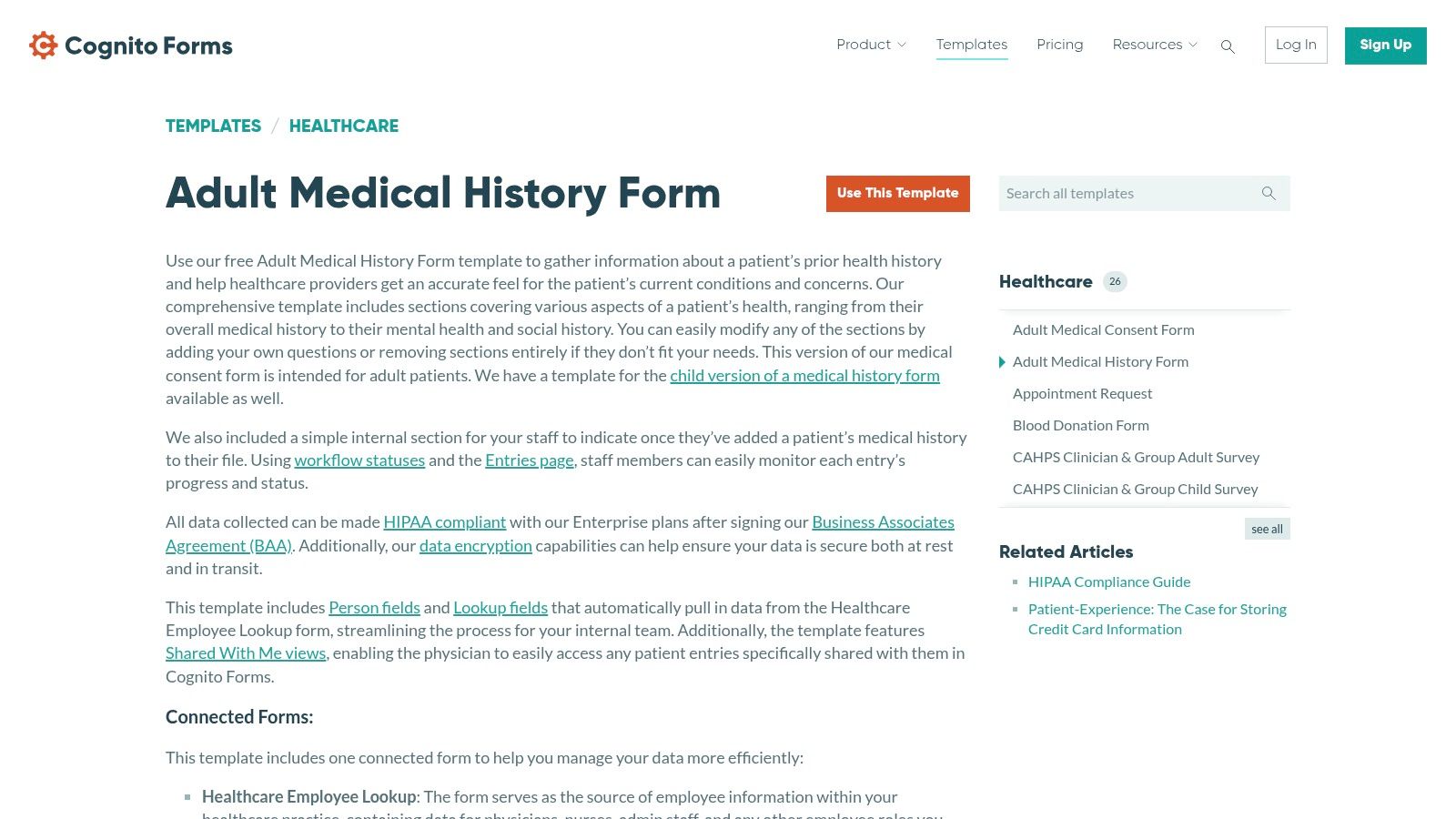
While Cognito Forms provides powerful features on its free and lower-tiered plans, true HIPAA compliance requires upgrading to its Enterprise plan and executing a Business Associate Agreement (BAA). This makes it a scalable solution, starting simple and growing with your practice's compliance needs. The platform's strength lies in its ability to handle complex data collection workflows before that information is securely transferred into a dedicated EMR system. For a closer look at how such forms integrate into patient onboarding, see these examples of patient intake form templates. The ability to save progress and resume later is also a valuable feature for longer, more detailed medical histories.
Best For: Practices needing advanced, customizable online forms with an option to scale up to HIPAA compliance.
Key Considerations
- Format: Digital, highly customizable online forms.
- Cost: Free plan available; HIPAA compliance is exclusive to the paid Enterprise plan.
- Customization: Extensive customization with conditional logic, calculations, and e-signatures.
- HIPAA Compliance: Available on the Enterprise plan with a signed BAA; data is encrypted in transit and at rest.
8. 123FormBuilder
123FormBuilder is a powerful, HIPAA-compliant online form builder that excels in serving the healthcare industry with its extensive template library and robust security features. It offers a comprehensive medical history form template that is both professional and easy to deploy. The platform is designed for practices that need more than a basic form, providing advanced functionalities like electronic signatures, conditional logic, and secure file uploads directly within the form. This makes it an ideal solution for clinics transitioning to fully digital intake processes. Being able to securely collect documents like insurance cards or referral letters directly within the form streamlines the entire registration process.
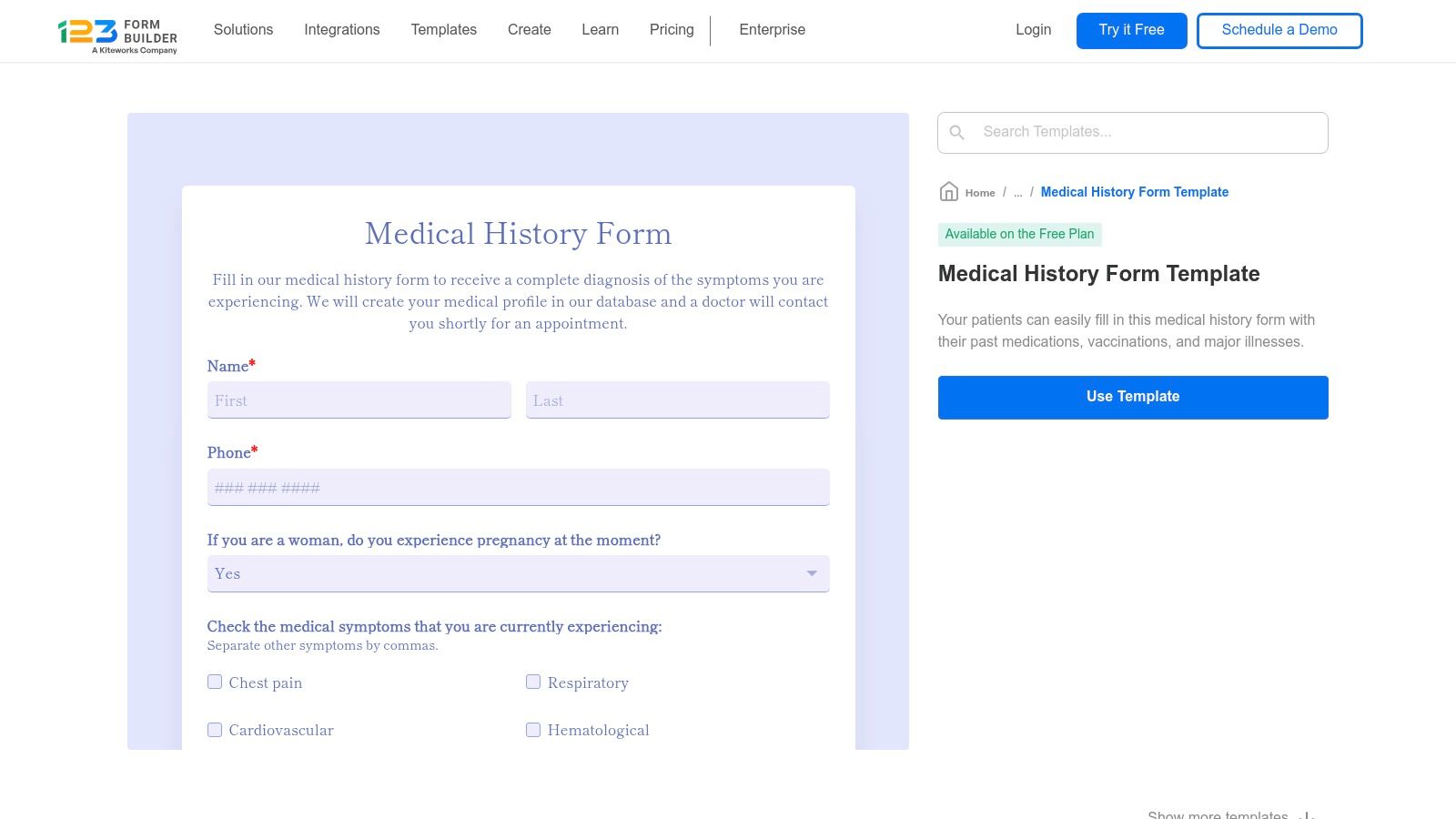
What sets 123FormBuilder apart is its enterprise-grade compliance framework. The platform offers a Business Associate Agreement (BAA) and incorporates necessary safeguards like data encryption to meet stringent HIPAA requirements. While the sheer volume of templates can feel overwhelming at first, the drag-and-drop builder simplifies customization, allowing users to tailor any medical history form template to their specific needs without any coding knowledge. This ease of use, combined with strong security protocols, makes it a reliable choice for practices of all sizes that prioritize data protection.
Best For: Small to large healthcare systems needing a secure, customizable, and HIPAA-compliant online form solution with a BAA.
Key Considerations
- Format: Digital, web-based forms with drag-and-drop customization.
- Cost: HIPAA compliance and advanced features require a paid plan (Gold or higher).
- Customization: Highly customizable; users can modify templates or build forms from scratch.
- HIPAA Compliance: Available on higher-tier plans, including a BAA and advanced security protocols.
9. IntakeQ
IntakeQ moves beyond a simple medical history form template and offers a comprehensive, HIPAA-compliant platform designed to automate the entire patient intake process. It is built specifically for healthcare practices that want to eliminate paper forms, reduce manual data entry, and streamline administrative workflows. The platform allows you to send secure, digital forms to patients via email or SMS, which they can complete on any device before their appointment. This pre-visit data collection ensures practitioners have all necessary information upfront, improving efficiency and patient care. The platform is especially popular among mental health professionals, physical therapists, and other specialists.
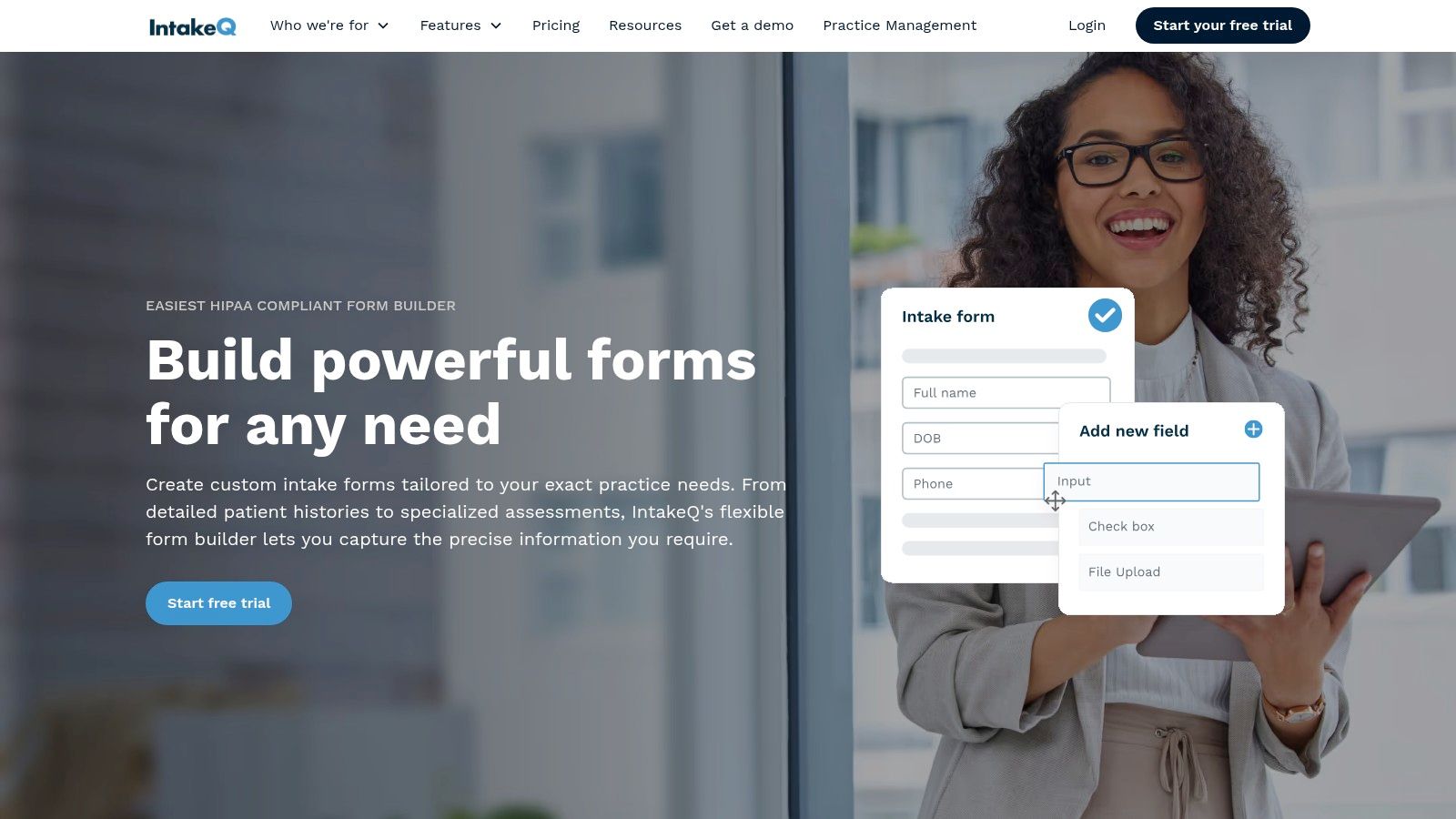
The system’s power lies in its robust drag-and-drop form builder, which includes features like conditional logic, e-signatures, and a library of pre-built templates for various specialties. While IntakeQ is a premium, subscription-based service, its value is in its end-to-end functionality, including appointment reminders and a secure patient portal. The initial setup and form customization require an investment of time, but the long-term administrative savings are significant for active practices. It effectively creates a centralized hub for all pre-appointment patient interaction, greatly reducing front desk workload.
Best For: Small to mid-sized practices and specialty clinics seeking a complete, HIPAA-compliant digital intake and practice management solution.
Key Considerations
- Format: Digital, HIPAA-compliant forms delivered via email/SMS.
- Cost: Subscription-based, with pricing tiers based on practitioner count and features.
- Customization: High; features a powerful drag-and-drop builder with conditional logic and pre-built specialty templates.
- HIPAA Compliance: Fully HIPAA-compliant, with secure data handling and e-signature capabilities.
10. SimplePractice
SimplePractice is an all-in-one practice management and EHR platform designed primarily for behavioral health professionals, though its tools are adaptable for various specialties. It excels by integrating a robust medical history form template system directly into its suite of services. Users can leverage an extensive library of pre-built intake forms or use the template builder to create fully customized questionnaires tailored to their specific patient populations and clinical needs. This integration ensures that patient data is collected, stored, and managed within a single, secure environment from the start, which is a major advantage for simplifying compliance and data management.
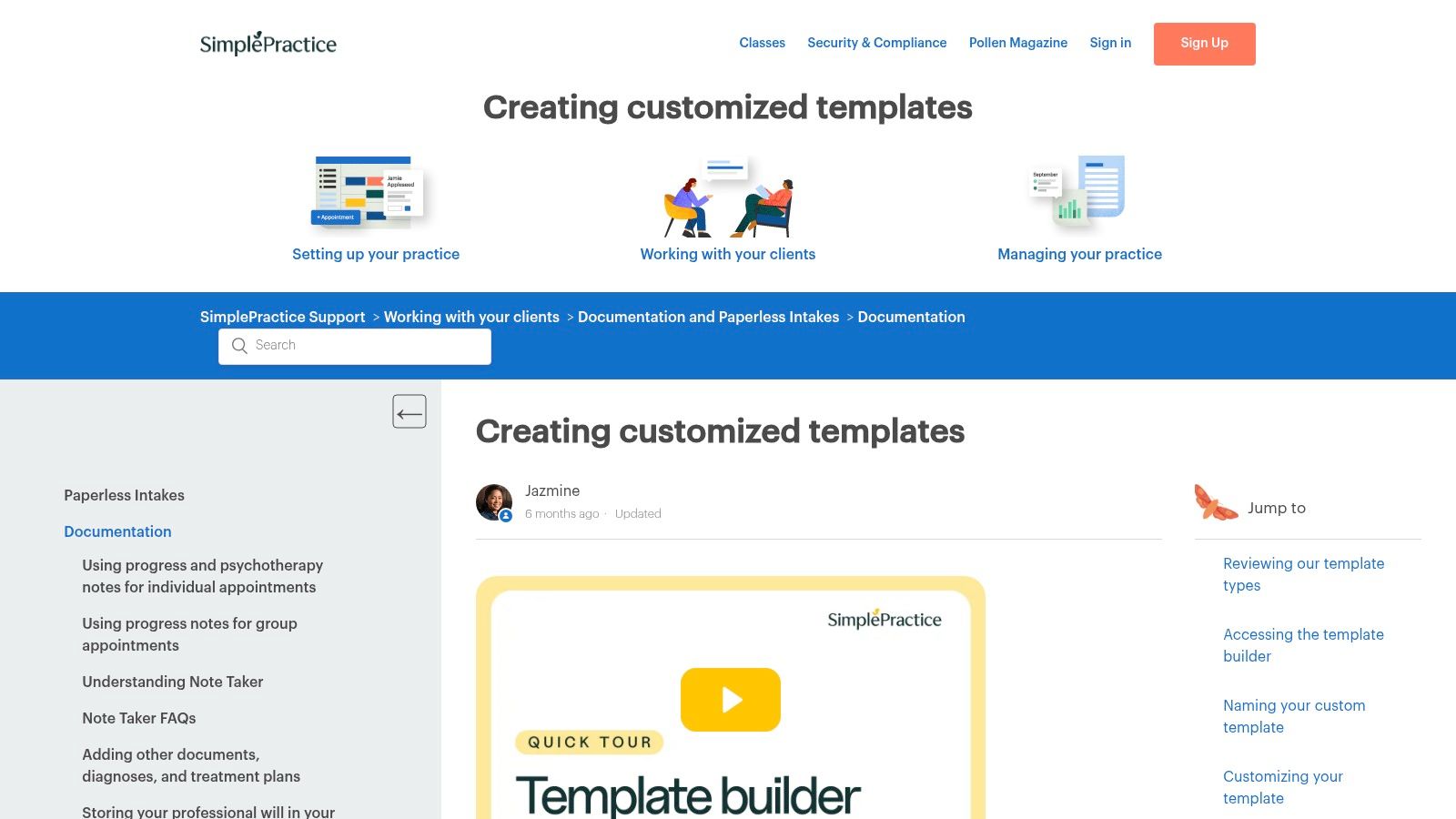
The platform's client portal is a key feature, allowing patients to complete and e-sign their medical history forms online before their appointment. This streamlines the intake process, reduces administrative workload, and ensures all information is automatically filed into the patient’s digital record. While its full capabilities are tied to a subscription, the seamless connection between form collection, scheduling, billing, and telehealth makes it an incredibly powerful tool for practices looking to automate their entire workflow. For private practitioners, this consolidation can replace multiple separate software subscriptions, offering significant value.
Best For: Behavioral health practices and other small to mid-sized clinics seeking an integrated EHR and practice management solution with built-in, customizable intake forms.
Key Considerations
- Format: Digital, customizable templates integrated into a client portal.
- Cost: Access is included with a SimplePractice subscription plan; pricing varies by tier.
- Customization: High customization with a template builder to add, remove, or modify questions.
- HIPAA Compliance: Fully HIPAA-compliant platform for data collection, storage, and management.
11. pdfFiller
For practices or individuals needing a quick, editable solution, pdfFiller provides a vast online library of fillable medical history form templates. This platform bridges the gap between static PDFs and fully integrated systems by allowing users to find a suitable template, edit it directly in their browser, add an e-signature, and then print or share it digitally. The main advantage is its immediacy; you can find, complete, and send a form in minutes without needing any special software. This is particularly useful for ad-hoc situations or when a practice needs to quickly adopt a standard form without investing in a complex system.
The platform is particularly useful for one-off needs, such as preparing for a new specialist appointment or for small offices that need a simple way to digitize a paper form. While it offers cloud sharing, users in clinical settings must ensure their handling process remains secure, as the platform itself is not a complete HIPAA-compliant workflow. It's best to review the content of any template, as their origins can vary, and they may not be as comprehensive as templates designed specifically by healthcare professionals. It serves as a great tool for editing and managing documents, but not for collecting sensitive patient data directly.
Best For: Individuals tracking personal health records or small clinics needing to quickly edit and print standard forms.
Key Considerations
- Format: Online library of editable, fillable, and printable PDF templates.
- Cost: Subscription-based service, though a trial is available to test features.
- Customization: High; users can edit text, add fillable fields, and include e-signatures online.
- HIPAA Compliance: Not inherently a HIPAA-compliant intake system; requires a separate secure process for handling patient data.
12. CDC’s My Family Health Portrait
As an authoritative public health resource, the CDC’s My Family Health Portrait offers a unique and highly credible tool focused specifically on the family history component of a medical history form template. This free, federally managed resource is designed for patients to collect, organize, and share their family's health history with their providers. It guides users through gathering crucial information, helping them understand genetic risks and facilitating more meaningful conversations during clinical visits. While not a complete intake form, it serves as an excellent supplementary tool that practices can recommend to patients beforehand, particularly in fields like primary care, genetics, and oncology where family history is critical.
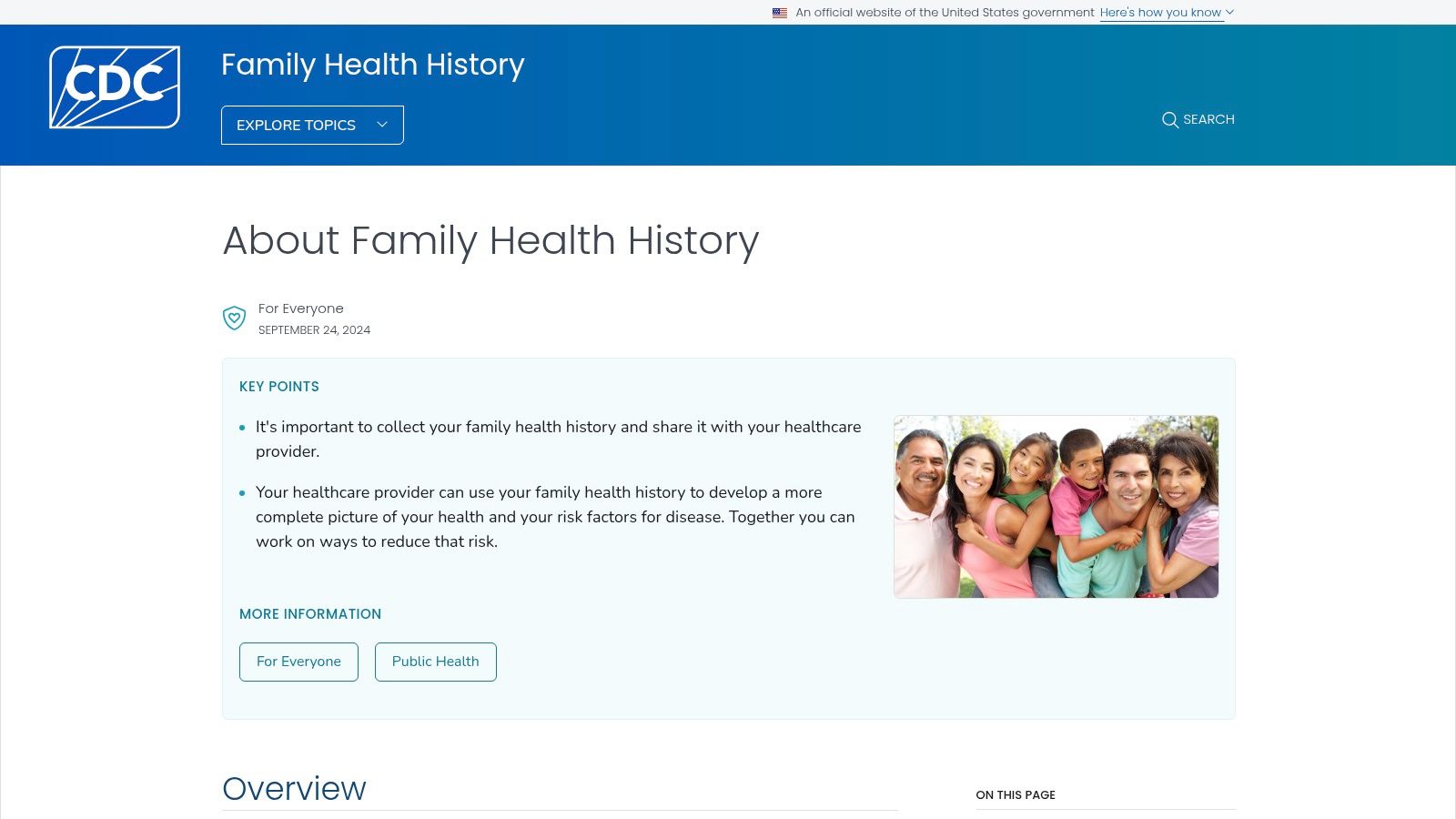
The platform’s primary strength is its patient-centric design and educational value. It simplifies a complex task, making it easier for clinics to obtain a comprehensive family history, which is often difficult to capture accurately during a short appointment. The tool allows users to save their history on their own computer or print it, ensuring privacy while empowering them to be active participants in their care. It is an ideal resource for practices looking to enhance patient engagement and improve the quality of collected data. By offloading this detailed task to the patient before their visit, clinicians can spend more appointment time on diagnosis and treatment planning.
Best For: Clinics and providers wanting to empower patients to gather a thorough family health history before their appointment.
Key Considerations
- Format: Free online tool accessible via web or mobile app.
- Cost: Completely free for all users.
- Customization: No customization; it is a standardized data collection tool, not a form builder.
- HIPAA Compliance: The tool is designed for patient use; data is saved locally on the user's device. It is the patient's responsibility to share it securely with their provider.
Visit CDC’s My Family Health Portrait
Medical History Form Template: 12-Resource Comparison
| Solution | Core Features / Functionality | User Experience & Quality ★ | Value Proposition 💰 | Target Audience 👥 | Unique Selling Points ✨ |
|---|---|---|---|---|---|
| Voice AI Agent – Pre Visit Intake | Automated 24/7 voice intake, EMR integration, med reconciliation | ★★★★★ Real-time call mgmt, zero hold times | 💰 Up to 60% admin cost savings | 👥 Healthcare practices, clinics | 🏆 Clinically-trained AI, HIPAA compliant |
| Amazon | Preprinted medical history notebooks and pads | ★★★ Variable quality (seller dependent) | 💰 Competitive pricing, Prime delivery | 👥 Students, residents, small offices | ✨ Fast shipping, wide variety of templates |
| Staples | Bulk preprinted medical history & compliance forms | ★★★ Standard paper form quality | 💰 Bulk pricing, business support | 👥 Clinics needing physical forms | ✨ Bulk packs, HIPAA sign-in sheets |
| Etsy | Downloadable, editable digital templates | ★★★ Varies by seller ratings | 💰 Very affordable, instant access | 👥 Solo practices, wellness clinics | ✨ Customizable, multiple digital formats |
| Jotform | HIPAA-capable online form builder, e-signatures, integrations | ★★★★ Easy deployment, mobile-ready | 💰 Paid HIPAA plan needed; scalable | 👥 Clinics digitizing intake processes | ✨ Conditional logic, PDF output |
| Formstack | Enterprise HIPAA-compliant forms & workflow automation | ★★★★ Robust compliance, scalable | 💰 Higher cost for advanced features | 👥 Large practices, enterprises | 🏆 Enterprise-grade automation & encryption |
| Cognito Forms | HIPAA compliance (Enterprise), conditional logic | ★★★★ Advanced form features | 💰 Affordable for non-HIPAA use | 👥 Clinics & small practices | ✨ Multi-page forms, save & resume |
| 123FormBuilder | HIPAA-compliant form builder with healthcare templates | ★★★★ Enterprise-level security | 💰 Paid plans for HIPAA features | 👥 Healthcare teams, enterprises | ✨ Large healthcare template library |
| IntakeQ | Healthcare-specific HIPAA intake platform | ★★★★ Designed for healthcare workflows | 💰 Subscription-based | 👥 Active healthcare practices | ✨ Patient portal, e-sign, scheduling |
| SimplePractice | Behavioral health EHR & practice management with intake forms | ★★★★ Comprehensive, integrated | 💰 Subscription-based | 👥 Behavioral health providers | 🏆 All-in-one PM/EHR & HIPAA compliance |
| pdfFiller | Fillable, printable editable medical forms | ★★★ Suitable for quick edits | 💰 Trial available; pay per usage | 👥 Small offices, personal use | ✨ Online editing & e-signature |
| CDC’s My Family Health Portrait | Free family history collection & sharing tool | ★★★ Basic but authoritative tool | 💰 Free | 👥 Patients, families | ✨ U.S. public health resource, educational |
Choosing the Right Template for Your Practice's Future
Navigating the landscape of medical history form templates can feel overwhelming, but the right choice streamlines your intake process, reduces administrative burden, and ultimately improves patient care. We've explored a wide spectrum of options, from simple printable PDFs offered by Staples and Etsy to sophisticated, HIPAA-compliant digital form builders like Jotform, IntakeQ, and Formstack. Each tool serves a distinct purpose, tailored to different practice sizes, specialties, and technological capabilities.
Your primary takeaway should be that a one-size-fits-all solution does not exist. A solo practitioner might find a customizable template from Cognito Forms perfectly adequate, while a large hospital system requires the robust integration and automation features of a platform like Formstack. Specialized practices, such as mental health clinics, will benefit immensely from industry-specific tools like SimplePractice, which are designed with their unique workflows in mind. Even innovative tools like the CDC’s family health history resource and AI-driven intake agents are reshaping how we think about data collection.
Final Considerations for Implementation
Before you commit to a new system, consider these final points to ensure a smooth transition and long-term success:
- Scalability: Will this solution grow with your practice? A free template is great for starting out, but will you need more advanced features like payment processing or EHR integration down the line? Thinking about your five-year plan is crucial.
- Patient Experience: How easy is the form for your patients to complete? A clunky, confusing interface can lead to incomplete information and patient frustration. Prioritize a clean, user-friendly design, especially for digital forms that will be completed on mobile devices.
- Staff Training: Implementing any new tool requires buy-in and training for your administrative and clinical staff. Factor in the time and resources needed to get your team comfortable with the new workflow. The simpler the tool, the faster the adoption.
Ultimately, the best medical history form template is one that becomes an invisible, yet indispensable, part of your practice's operations. It should empower your team to focus on what truly matters: providing exceptional patient care. As you look toward future-proofing your practice's workflows, you might even consider building custom internal tools. For a broader perspective on this, exploring a ranking of the best no-code platforms can provide valuable insights into creating bespoke solutions without extensive development resources. Your choice today is an investment in a more efficient and patient-centric future.
Ready to move beyond static forms and revolutionize your patient intake? Discover how Simbie AI uses an intelligent voice AI agent to handle pre-visit intake, gathering comprehensive medical histories through natural conversation. Visit Simbie AI to see how you can save your staff hours of administrative work and provide a modern, seamless experience for your patients.

